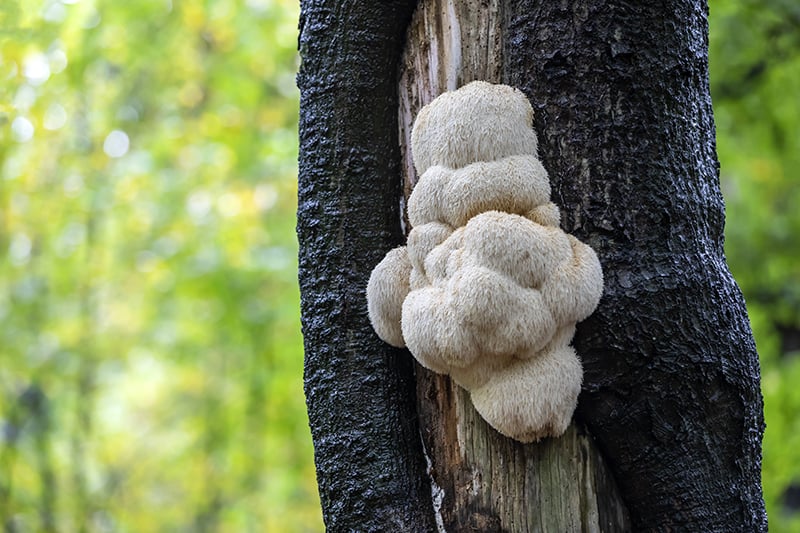Known as the “nerve mushroom”, Lion’s Mane mushroom has spread throughout the minds of those interested in its innate abilities to positively impact the human nervous system. Despite its name, this edible mushroom has nothing to do with the mane of lions. It gets its name from its cascading white strands forming the appearance of a puffy mane. There are 3 main parts of mushrooms, the mycelium, spores, and fruiting body. However, what we commonly associate mushrooms with is the fruiting body. The fruiting body is the visible part of the mushroom, that grows from the substrate which is usually deadfall otherwise known as fallen trees or logs. It is usually foraged during late summer and early fall and can be found fruiting on American Beech trees. Revered for its cognitive qualities, the cultivation of Lion’s Mane has a long-dated history of the neurological health of humans.
What is Lion’s Mane Mushroom
It is made up of three species with Hericium Erinaceus being the most commonly cultivated. Equally, H. Americanum and H. Coralloides are considered to be a part of the Lion’s Mane family. Considerably, all members of this unique species produce white fruiting bodies with descending downward spines. Named “Hou Tou Gu” in Chinese and “yamabushitake” meaning “bearded tooth fungus” in Japanese, this white shaggy mushroom is claimed to be the king of bioactive fungi.
Furthermore, it has caught the taste buds of high-ranking chefs, being described as having a seafood-like taste resembling that of lobster, making it an essential ingredient in specialty markets around the world. However, in countries such as Japan and China, where this brain activating fungi is extremely popular, Lion’s Mane is found in kitchens not only as a culinary delicacy but as a medicinal supplement. In fact, it has been used for its medicinal properties for millennia.
Traditional Uses
Traditional Chinese Medicine (TCM) seeks to balance the mind, body, and spirit through holistic practices significantly different from the Western medicine model of health care. Commonly thought of as “folk medicine” the Chinese included it in their daily lives for nutritional and medicinal purposes. Lion’s Mane mushroom has been used in TCM for millennia for its said ability to nurture the liver, lung, spleen, heart, and kidney.
Origin and History
Chinese medicine goes back to the Dynasty Era, when many mushrooms which were abundant in nature first became discovered by Chinese traditional healers. However, artificial cultivation of Lion’s Mane was first reported in China in 1988 where it was cultured in artificial logs using polypropylene bags and bottles. This white multi-tailed mushroom continues to be a source of sustenance for countries around the world who have caught wind of its neurological healing abilities through TCM. Including the United States, where medicinal mushrooms have become prominent in the alternative healing and wellness space.
Commonly Reported Benefits & Effects
Brain Function
The benefits of Lion’s Mane on brain function are plentiful. Studies have shown that compounds in it can stimulate the growth of brain cells. Additionally, research suggests that it may help protect against Alzheimer’s disease. One study found that patients with mild cognitive impairment consuming the mushroom for four months significantly improved mental functioning. Moreover, research has found that it stimulates the growth and repair of nerve cells.
Depression and Anxiety
For those seeking relief of mild depression and anxiety, Lion’s Mane extract may reduce symptoms of anxiety and depression due to its anti-inflammatory effects. It has also been shown to improve the functioning of the hippocampus, the part of the brain that manages the processing of memories and emotional responses. Another study showed it reduced irritability and anxiety amongst menopausal women.
Digestive Benefits
Lion’s Mane has been shown to protect against ulcers in the digestive tract. Furthermore, several studies have shown its ability to reduce inflammation and prevent tissue damage in other areas of the intestines delivering promising results for those suffering from bowel diseases like ulcerative colitis and Crohn’s disease. Some research also suggests Lion’s Mane may help fight cancers like stomach, colon, and liver cancer.
Immunity Boosting Effects
Lion’s Mane mushroom can boost immunity by increasing the activity of the intestinal immune system which may be credited to the positive changes it creates in gut bacteria. One study found that this bountiful mushroom protected against the effects of Salmonella. However, more research is needed for its immune-boosting effects in humans.
Potential Dangers
There have been no human studies on the potential dangers of Lion’s Mane but it seems to be generally safe. There have been studies on rats and even at higher doses, there have not been any adverse effects. However, those who are sensitive or allergic to mushrooms should avoid it, and those who are pregnant or breastfeeding. As always, it’s best to consult with a healthcare professional before consuming any medicinal products or supplements.
Common Uses of Lion’s Mane Mushroom
Lion’s Mane Tea
When it comes to mushrooms, the polysaccharides are best extracted in water, which gives Lion’s Mane its cancer-fighting abilities. Tea can be an effective way to boost cognitive ability. The tea can be prepared directly from boiling raw Lion’s Mane or there are pre-made options available.
Lion’s Mane Coffee
Consumed synergistically alongside coffee, it is used to boost coffee’s effectiveness providing neurological benefit while getting your daily dose of caffeine. Enhancing focus while combating mental fog, Lion’s Mane coffee is a promising concoction for those seeking to stay alert throughout the day.
Lion’s Mane Powder
A mushroom powder is a perfect addition to smoothies, hot cocoa, baked goods, etc. It can also be used as a cognitive-enhancing tea. Typically, the powder form is first extracted from either alcohol, water, or dual-extracted (combining both an alcohol and water extract) then freeze-dried to a powder form. Dual extraction is highly recommended because the Triterpenoids are not water-soluble and must be alcohol extracted in order to receive the full range of benefits it has to offer.
Lion’s Mane Spores
For those seeking to maintain a colony of their own, spores are available in grow kits and syringes. Grow kits are a simple and effective way to grow mushrooms requiring little management. Whereas growing from your own substrate isn’t necessarily labor-intensive but it does require some previous knowledge of fungiculture, and depending on the way it’s grown is generally more time-consuming though, the ability to grow your own mushrooms from scratch is an achievement worth working towards.

Where to Buy Lion’s Mane Mushrooms
With educational films like Fantastic Fungi, the recent acknowledgment and fascination of mushrooms has grown tremendously which has made medicinal mushrooms rather accessible. A wide variety of Chinese markets and herbal apothecaries carry it. Equally, the online market of grow kits and cultured syringes has expanded immensely. Of course, we carry a wide array of medicinal mushrooms as well. Our variety of Lion’s Mane elixirs, powders, and supplements are from trusted sources such as Host Defense, Four Sigmatic, and Catskill Fungi. Check out our full list of mushroom products here.
FAQ
Is Lion’s Mane Safe for Cats or Dogs?
For cats and dogs suffering from neurological or nerve-ending disorders, Lion’s Mane may be a safe and natural treatment option. Although there have not been studies of the it’s effects on dogs or cats specifically, it is generally considered safe but it is always vital to check with your veterinarian before offering any supplements or medications to your four-legged companion.
What is the Optimal Lion’s Mane Dosage?
The rule of thumb with any supplement is to take the recommended serving on the nutritional label of your product. For those cultivating it themselves, in several clinical studies measuring the effects on cognitive function, the following dosages have been used: 750 mg/3 times a day of Lion’s Mane for 16 weeks in powder form and 5 g/day of the fruiting body consumed as tea. However, a typical dose ranges from 500-3000mg a day. The form of consumption should also be taken into account. For example, 5g of extract may be equivalent to 50g of raw Lion’s Mane.
How to Cook Lion’s Mane Mushroom?
It is not only nutritious but extremely tasty. With its lobster-like flavor and soft texture similar to cauliflower, its use in fine dining is extensive. Though, making a delicious dish with Lion’s Mane is just as easy to do in the comfort of your home. This fibrous mushroom can be pan-fried, blackened, sauteed, and even roasted. Adding fresh ingredients like garlic and lemon accentuate the natural seafood flavor and is a considerable option for those allergic to shellfish.
References
“(PDF) Lion’s Mane Mushroom; New Addition to Food and Natural Bounty for Human Wellness: A Review.” ResearchGate. – Link
Aung, Steven Kh. “The Clinical Use of Mushrooms from a Traditional Chinese Medical Perspective.” International Journal of Medicinal Mushrooms, Begel House Inc. – Link




Do you have a printed cookbook on Lion Mane Mushrooms
Hi there, Teddy! While we don’t have a specific cookbook on Lion’s Mane Mushrooms, we do offer this Plant Magic book that has handy herbal recipes! Might be worth checking out.